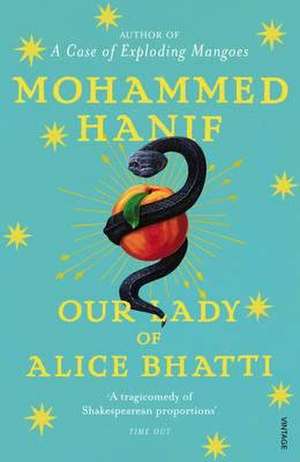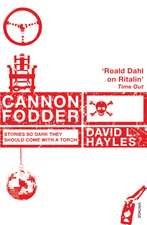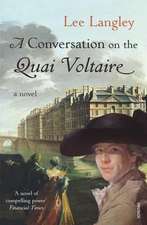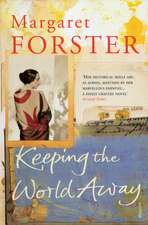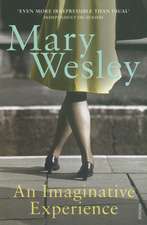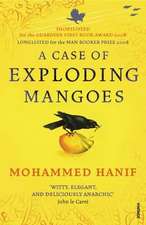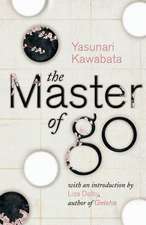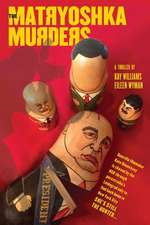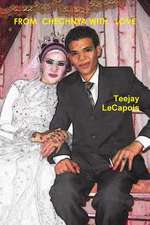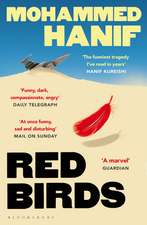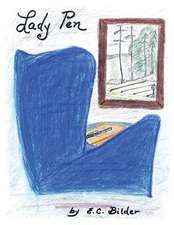Our Lady of Alice Bhatti
Autor Mohammed Hanifen Limba Engleză Paperback – 3 oct 2012
| Toate formatele și edițiile | Preț | Express |
|---|---|---|
| Paperback (2) | 52.17 lei 21-33 zile | +18.23 lei 6-12 zile |
| Vintage Publishing – 3 oct 2012 | 52.17 lei 21-33 zile | +18.23 lei 6-12 zile |
| VINTAGE BOOKS – 25 feb 2013 | 105.19 lei 6-8 săpt. |
Preț: 52.17 lei
Preț vechi: 63.03 lei
-17% Nou
Puncte Express: 78
Preț estimativ în valută:
9.98€ • 10.53$ • 8.32£
9.98€ • 10.53$ • 8.32£
Carte disponibilă
Livrare economică 13-25 decembrie
Livrare express 28 noiembrie-04 decembrie pentru 28.22 lei
Preluare comenzi: 021 569.72.76
Specificații
ISBN-13: 9780099516750
ISBN-10: 0099516756
Pagini: 240
Dimensiuni: 131 x 206 x 18 mm
Greutate: 0.18 kg
Editura: Vintage Publishing
ISBN-10: 0099516756
Pagini: 240
Dimensiuni: 131 x 206 x 18 mm
Greutate: 0.18 kg
Editura: Vintage Publishing
Notă biografică
Mohammed Hanif was born in Okara, Pakistan, in 1965. He graduated from Pakistan Air Force Academy as Pilot Officer, but subsequently left to pursue a career in journalism. He has written plays for the stage and BBC radio, and his film The Long Night has been shown at film festivals around the world. His first novel, A Case of Exploding Mangoes won the Commonwealth Writers' Prize for Best First Novel in 2008.
Extras
Excerpted from the Hardcover Edition
One
Less than three minutes in front of the interview panel and Alice Bhatti knows in her heart that she is not likely to get the job advertised as Replacement Junior Nurse, Grade 4. A sharp tingling in the back of her neck warns her that not getting the job might not even be the worst thing that could happen here. No questions have been asked yet, but she knows that all the preparation--her starched white uniform, the new file, a faint smudge of mud-brown lipstick, breathing exercises she has done to control her jumpy heart, even the banana she ate on the bus to stop her stomach from rumbling--all seems like wasted investment, halal money down the haram drain, as her father Joseph Bhatti had put it. “These Muslas will make you clean their shit and then complain that you stink,” he had said. “And our own brothers at the Sacred? They will educate you and then ask you why you stink.”
She has been in this room before but is dreading the prospect of sitting down on a chair and talking. She has always stood here and taken her orders: Have you cleaned the floor, Alice? Why have you not cleaned the floor? Who do you think will clean that blood on the floor, Alice? Your father?
The room is a monument to pharmaceutical merchandising: the orange wall clock from GlaxoSmithKline, the calendar with blonde models in various stages of migraine from Pfizer Pain Management Systems, the box of pink tissues promising Dry Days, Dry Nights. The ornamented gold-framed verse from the Quran exhorting the virtues of cleanliness carries the logo of Ciba-Geigy: a housefly in its death throes.
Alice Bhatti wonders if she can put in a request to be interviewed while standing. She shifts on her feet and tries to become invisible by clutching the file to her chest. The file contains nothing except a copy of her job application. She doesn’t get the opportunity to ask anything as the interview panel is too busy debating the cost-benefit ratio for patients on pacemakers. They are at the end of a heated argument and everyone wants to get the last word in. She doesn’t really understand what they are talking about, only wonders why she was called in if all they were going to talk about was electricity generators, ventilators, running costs and heartless relatives of the deceased arriving from Toronto or Dubai, brandishing their grief to save some dollars or dirhams, refusing to pay up, holding ambulance drivers hostage, demanding compensation.
She has an odd sensation of overhearing a conversation that she is meant to overhear. She thinks maybe this conversation is part of the recruitment exercise; she’ll be asked her views later and she should pay attention. The head of the orthopaedic unit only brings up words like “professionalism” and “Canadian immigration” when he is angry. Ortho Sir is very angry by now. “I am a professional.” He pulls out a pink tissue from the Dry Nights box and pats the bald patch on his head. The grey diamond-shaped mark on his forehead is a testament to his five-times-a-day prayer routine, but his designer goatee belongs in some kafir fantasy. “My job is to cure people, to cure them at the worst of times. I don’t decide when someone is going to die. He does.” He raises his forefinger towards the ceiling. Alice Bhatti looks at the ceiling fan in confusion: Put Your Faith in Philips, it says.
If the relatives of the deceased are in Dubai and Toronto, she wonders, then what is the deceased doing in this death hole otherwise known as the Sacred Heart Hospital for All Ailments. Rights of admission reserved, it says in three languages on the signboard at the entrance. Enter at your peril, someone has scrawled under it, summing up the customers’ sentiments. Leave your firearms and faith at the gate, says another sign under a small wooden cross, slightly askew and not painted in a long time, in the hope that people will forget that it’s a Catholic establishment. This is not the kind of gate where anybody leaves anything, this is not the kind of place where people forget where you come from.
Senior Sister Hina Alvi sits on the interview panel with a paan tucked in the right side of her mouth, her tongue occasionally licking the crimson juice before it can become a dribble. This well-timed anticipatory lick will remain her main contribution to the proceedings. Alice Bhatti doesn’t need an advanced nursing degree to know that Sister Hina doesn’t like her. The only consolation is that there isn’t much that Sister Hina Alvi does like. Alice smiles at her in the futile hope of winning her over. Nothing. She looks at her terrifying poise, the imperceptible movement of her jaw, the crimson lips, and her eyes that seem to be taking part in the discussion, and realises that Senior Sister Alvi’s feelings towards her are slightly stronger than indifference: she hasn’t yet decided whether this Alice woman even exists or not. Dr. Jamus Pereira, the chief medical officer of the hospital, is Alice Bhatti’s only hope on this panel; he is the CMO for no reason other than the fact that he inherited the Sacred from his father, and he inherited it because of his inability to say no. But who can say no to a dying father who is pressing the family Bible into your hands?
He sits with his fist under his chin and seems to be wondering how long before Ortho Sir will start healing multiple fractures with the power of his principled stance.
Alice looks at him and realises that if Dr. Jamus Pereira is your best hope in this world, you’d better abandon all hope.
“And what do you want?” Ortho Sir looks at her as if she is a child trying to interrupt a grown‑up conversation.
“A and E vacancy.” Dr. Pereira speaks before Alice Bhatti can turn and run. “Please have a seat, Alice.”
Normally Alice finds Dr. Pereira’s politeness irritating--Sir, if you don’t mind, I would like to inform you that the gentleman you accompanied to this hospital at the time of his admission has breathed his last. She always thinks his struggle to bring order to this world through the practice of good manners is a bit pointless. But she likes every word of it now. She likes the fact that he has called her Alice. It implies acceptance, professional fellowship, even intimacy, an innocent type of intimacy. She likes the way he has uttered the word “seat.”
She also realises that when you start feeling gratitude to people for asking you to sit down, you are obviously not at the top of your game.
“How many candidates have we got?” Ortho Sir looks at his watch impatiently. He is on a break from being a humble professional. This usually happens when underlings are around. In private he can make his superiors feel like little gods. When he is brazen and publicly rude, the network of veins on his bald head swells up and you can see them turning green with anguish, like an alien realising it’s not going home for a long time. That the earth has run out of the fuel that his spaceship relies on.
“Only the lonely,” Dr. Pereira says, looking optimistically at both his colleagues. Senior Sister Alvi curls her lip in a smile that seems to suggest that she knows the con, has heard the joke before, but is too far above all of this to bother.
“Then why do we have to go through this?” Ortho Sir pushes the file away and looks at Alice Bhatti.
Alice Bhatti looks at a lizard on the wall, desperately willing it to move, as if its movement will affect the movement of her stars.
“Procedures,” says Dr. Pereira. “And if my colleagues here have objections, we don’t have to, we can advertise externally. But there are not many qualified candidates with experience. Privates snap them up. Or they go to Dubai or Toronto.” There was a time when he could assert his authority and claim that the hospital was built by my father and named after our Holy Mother so why should anybody have a problem hiring a nurse who happens to be Catholic? Now he must stay polite and humble in all his little battles.
“All the good ones go to Dubai and Toronto.” Ortho Sir is mild now--and mean, having fully exposed the inherent inefficiency of the system. He has just received his Canadian visa and it has given him more confidence than those twenty-five years of setting bones in an operating theatre, even more than his two trips to Mecca. Spiritually, he always reminds his colleagues, he feels much more settled now; he quotes from the Hadith, which says something about knowledge and having to go to China. Nobody reminds him that Toronto is not in China. Not yet.
Senior Sister Hina Alvi looks at them with contempt, as if they have stepped over some invisible boundary of good taste, as if words like “procedure,” “vacancy” and “candidate” are vulgar and shouldn’t be used in front of ladies. She does all of this with a little twitch of her upper lip and a pat on her steel hair.
Senior Sister Hina Alvi has thirty-five years of bedside experience, she has worked through riots and massacres and saved the life of a foreign minister’s wife. She knows about these things. Alice Bhatti is always surprised how Senior Sister can get the world to obey her with the movement of an eyebrow.
Alice Bhatti first sits on the edge of the chair, feels dizzy, then fears that the chair might slip from under her and she will end up sprawled on the floor with her legs splayed in the air. She moves back in the chair, the chair squeaks and she puts the file in her lap, then picks it up and clasps it to her chest. Then realising that she is making a spectacle of herself, she puts it back in her lap and thrusts her hands under her thighs, to stop them from trembling.
“So are you Alice or are you Bhatti?” Sir Ortho believes that this country can only progress if people start spelling out their middle names, tucking in their shirts and paying his full fees in advance.
“Both. That is my name.” Alice Bhatti feels silly having to explain her name. There might be things in the application she has embellished, but her name is not one of them.
“I am surprised that you are trying to hide basic information. Your full name is Alice Joseph Bhatti. Are you ashamed of your father’s name? Now Bhatti is a respectable clan from Punjab and I am sure the Josephs are a respectable lot from wherever they are from. Let me tell you something: my father was a schoolteacher and went to teach in a school on his bicycle for thirty-five years. Same route. Same bicycle. Am I ashamed of him now? No, that bicycle is parked in my garage, along with my Camry. So that my kids can see it and learn. Do I hide it from the world? No.”
Dr. Pereira’s administrative intervention comes in the form of a polite cough, the clearing of an already clear throat and his fingers playing a half-remembered jazz beat on the table. He was practising his drums with the Hawks Bay Kittens the night his father called him and before breathing his last handed him the Sacred Heart Hospital for All Ailments. “The application form doesn’t have provision for middle names, and Bhattis are pretty much everywhere, in every religion, so if we can start the--”
“So, Miss Alice Joseph Bhatti, why should we give you this job?” Ortho Sir asks her without looking up and starts scribbling furiously in his file. The bicycle-riding-schoolteacher’s son has come this far in life because he knows when to move on.
Senior Sister Hina Alvi looks at her with a beatific smile, as if already forgiving her for all the mistakes she’ll make in the rest of her brief and miraculous career. Dr. Pereira sends her silent messages: Praise Our Lord Yassoo, now don’t let me down, child, not in front of these Muslas. Short, to-the-point interventionist prayers are Dr. Pereira’s other management tool besides good manners.
This is simple. Alice Bhatti knows the answer. She has rehearsed it in front of the mirror. But now she needs water. Her heart beats in her parched throat. A strange croak comes out of her mouth, a voice that surprises her, the voice of a baby frog complaining about being too small for this world. She notices, for the first time in her life, that the lizard has four feet.
“I have qualifications . . .” She realises that she has forgotten the rest of her answer. She decides to carry on recklessly, like a pedestrian caught in the middle of a fast lane who decides that if they close their eyes and rush forward they will end up safe on the other side. It all comes out in a jumble. Accident assessment. Paediatric management. First-aid course: FA second division. Serving patients and humanity. Taking care of the sick and dying. Experience in TB ward before it was closed down. Personal setbacks. Difficult patient-and-doctor relationships. Maternity ward internship. Flexiworking.
Having spoken for one whole minute without fainting, Alice Bhatti takes a deep breath and realises that she has just blurted out everything she was supposed to say over the course of the entire interview.
An ambulance siren sings in the distance, and the ceiling fan suddenly picks up speed. Her dupatta flares in a gust of wind and the faces of the three people sitting in front of her blur into a crowd, a crowd that is headed for a pre-planned lynching somewhere else but decides to first warm up on a stray dog. The ambulance siren comes very close and Alice remembers a dream she had the previous night. She is in an ambulance, the ambulance is a ball of fire, it’s rushing away from the Sacred. She had been puzzled in her dream. An ambulance on fire she can understand. What was she doing in the ambulance? Why was her face covered in ice cubes? Why was the ambulance rushing away from the hospital?
“According to the modern principles of nursing and the patient-carer relationship . . .”
“Did you say you worked in Accidents?” Sir Ortho cuts her short, then pats the alien on his head. “Oh. Of course. Sure you worked in Accidents. Didn’t we have a little accident there? How could I forget?” Alice Bhatti cannot believe that Ortho Sir would remember her face. She remembers his face, though. She remembers a bucket and a mop and a river of blood on the floor. She remembers him tripping over her mop.
One
Less than three minutes in front of the interview panel and Alice Bhatti knows in her heart that she is not likely to get the job advertised as Replacement Junior Nurse, Grade 4. A sharp tingling in the back of her neck warns her that not getting the job might not even be the worst thing that could happen here. No questions have been asked yet, but she knows that all the preparation--her starched white uniform, the new file, a faint smudge of mud-brown lipstick, breathing exercises she has done to control her jumpy heart, even the banana she ate on the bus to stop her stomach from rumbling--all seems like wasted investment, halal money down the haram drain, as her father Joseph Bhatti had put it. “These Muslas will make you clean their shit and then complain that you stink,” he had said. “And our own brothers at the Sacred? They will educate you and then ask you why you stink.”
She has been in this room before but is dreading the prospect of sitting down on a chair and talking. She has always stood here and taken her orders: Have you cleaned the floor, Alice? Why have you not cleaned the floor? Who do you think will clean that blood on the floor, Alice? Your father?
The room is a monument to pharmaceutical merchandising: the orange wall clock from GlaxoSmithKline, the calendar with blonde models in various stages of migraine from Pfizer Pain Management Systems, the box of pink tissues promising Dry Days, Dry Nights. The ornamented gold-framed verse from the Quran exhorting the virtues of cleanliness carries the logo of Ciba-Geigy: a housefly in its death throes.
Alice Bhatti wonders if she can put in a request to be interviewed while standing. She shifts on her feet and tries to become invisible by clutching the file to her chest. The file contains nothing except a copy of her job application. She doesn’t get the opportunity to ask anything as the interview panel is too busy debating the cost-benefit ratio for patients on pacemakers. They are at the end of a heated argument and everyone wants to get the last word in. She doesn’t really understand what they are talking about, only wonders why she was called in if all they were going to talk about was electricity generators, ventilators, running costs and heartless relatives of the deceased arriving from Toronto or Dubai, brandishing their grief to save some dollars or dirhams, refusing to pay up, holding ambulance drivers hostage, demanding compensation.
She has an odd sensation of overhearing a conversation that she is meant to overhear. She thinks maybe this conversation is part of the recruitment exercise; she’ll be asked her views later and she should pay attention. The head of the orthopaedic unit only brings up words like “professionalism” and “Canadian immigration” when he is angry. Ortho Sir is very angry by now. “I am a professional.” He pulls out a pink tissue from the Dry Nights box and pats the bald patch on his head. The grey diamond-shaped mark on his forehead is a testament to his five-times-a-day prayer routine, but his designer goatee belongs in some kafir fantasy. “My job is to cure people, to cure them at the worst of times. I don’t decide when someone is going to die. He does.” He raises his forefinger towards the ceiling. Alice Bhatti looks at the ceiling fan in confusion: Put Your Faith in Philips, it says.
If the relatives of the deceased are in Dubai and Toronto, she wonders, then what is the deceased doing in this death hole otherwise known as the Sacred Heart Hospital for All Ailments. Rights of admission reserved, it says in three languages on the signboard at the entrance. Enter at your peril, someone has scrawled under it, summing up the customers’ sentiments. Leave your firearms and faith at the gate, says another sign under a small wooden cross, slightly askew and not painted in a long time, in the hope that people will forget that it’s a Catholic establishment. This is not the kind of gate where anybody leaves anything, this is not the kind of place where people forget where you come from.
Senior Sister Hina Alvi sits on the interview panel with a paan tucked in the right side of her mouth, her tongue occasionally licking the crimson juice before it can become a dribble. This well-timed anticipatory lick will remain her main contribution to the proceedings. Alice Bhatti doesn’t need an advanced nursing degree to know that Sister Hina doesn’t like her. The only consolation is that there isn’t much that Sister Hina Alvi does like. Alice smiles at her in the futile hope of winning her over. Nothing. She looks at her terrifying poise, the imperceptible movement of her jaw, the crimson lips, and her eyes that seem to be taking part in the discussion, and realises that Senior Sister Alvi’s feelings towards her are slightly stronger than indifference: she hasn’t yet decided whether this Alice woman even exists or not. Dr. Jamus Pereira, the chief medical officer of the hospital, is Alice Bhatti’s only hope on this panel; he is the CMO for no reason other than the fact that he inherited the Sacred from his father, and he inherited it because of his inability to say no. But who can say no to a dying father who is pressing the family Bible into your hands?
He sits with his fist under his chin and seems to be wondering how long before Ortho Sir will start healing multiple fractures with the power of his principled stance.
Alice looks at him and realises that if Dr. Jamus Pereira is your best hope in this world, you’d better abandon all hope.
“And what do you want?” Ortho Sir looks at her as if she is a child trying to interrupt a grown‑up conversation.
“A and E vacancy.” Dr. Pereira speaks before Alice Bhatti can turn and run. “Please have a seat, Alice.”
Normally Alice finds Dr. Pereira’s politeness irritating--Sir, if you don’t mind, I would like to inform you that the gentleman you accompanied to this hospital at the time of his admission has breathed his last. She always thinks his struggle to bring order to this world through the practice of good manners is a bit pointless. But she likes every word of it now. She likes the fact that he has called her Alice. It implies acceptance, professional fellowship, even intimacy, an innocent type of intimacy. She likes the way he has uttered the word “seat.”
She also realises that when you start feeling gratitude to people for asking you to sit down, you are obviously not at the top of your game.
“How many candidates have we got?” Ortho Sir looks at his watch impatiently. He is on a break from being a humble professional. This usually happens when underlings are around. In private he can make his superiors feel like little gods. When he is brazen and publicly rude, the network of veins on his bald head swells up and you can see them turning green with anguish, like an alien realising it’s not going home for a long time. That the earth has run out of the fuel that his spaceship relies on.
“Only the lonely,” Dr. Pereira says, looking optimistically at both his colleagues. Senior Sister Alvi curls her lip in a smile that seems to suggest that she knows the con, has heard the joke before, but is too far above all of this to bother.
“Then why do we have to go through this?” Ortho Sir pushes the file away and looks at Alice Bhatti.
Alice Bhatti looks at a lizard on the wall, desperately willing it to move, as if its movement will affect the movement of her stars.
“Procedures,” says Dr. Pereira. “And if my colleagues here have objections, we don’t have to, we can advertise externally. But there are not many qualified candidates with experience. Privates snap them up. Or they go to Dubai or Toronto.” There was a time when he could assert his authority and claim that the hospital was built by my father and named after our Holy Mother so why should anybody have a problem hiring a nurse who happens to be Catholic? Now he must stay polite and humble in all his little battles.
“All the good ones go to Dubai and Toronto.” Ortho Sir is mild now--and mean, having fully exposed the inherent inefficiency of the system. He has just received his Canadian visa and it has given him more confidence than those twenty-five years of setting bones in an operating theatre, even more than his two trips to Mecca. Spiritually, he always reminds his colleagues, he feels much more settled now; he quotes from the Hadith, which says something about knowledge and having to go to China. Nobody reminds him that Toronto is not in China. Not yet.
Senior Sister Hina Alvi looks at them with contempt, as if they have stepped over some invisible boundary of good taste, as if words like “procedure,” “vacancy” and “candidate” are vulgar and shouldn’t be used in front of ladies. She does all of this with a little twitch of her upper lip and a pat on her steel hair.
Senior Sister Hina Alvi has thirty-five years of bedside experience, she has worked through riots and massacres and saved the life of a foreign minister’s wife. She knows about these things. Alice Bhatti is always surprised how Senior Sister can get the world to obey her with the movement of an eyebrow.
Alice Bhatti first sits on the edge of the chair, feels dizzy, then fears that the chair might slip from under her and she will end up sprawled on the floor with her legs splayed in the air. She moves back in the chair, the chair squeaks and she puts the file in her lap, then picks it up and clasps it to her chest. Then realising that she is making a spectacle of herself, she puts it back in her lap and thrusts her hands under her thighs, to stop them from trembling.
“So are you Alice or are you Bhatti?” Sir Ortho believes that this country can only progress if people start spelling out their middle names, tucking in their shirts and paying his full fees in advance.
“Both. That is my name.” Alice Bhatti feels silly having to explain her name. There might be things in the application she has embellished, but her name is not one of them.
“I am surprised that you are trying to hide basic information. Your full name is Alice Joseph Bhatti. Are you ashamed of your father’s name? Now Bhatti is a respectable clan from Punjab and I am sure the Josephs are a respectable lot from wherever they are from. Let me tell you something: my father was a schoolteacher and went to teach in a school on his bicycle for thirty-five years. Same route. Same bicycle. Am I ashamed of him now? No, that bicycle is parked in my garage, along with my Camry. So that my kids can see it and learn. Do I hide it from the world? No.”
Dr. Pereira’s administrative intervention comes in the form of a polite cough, the clearing of an already clear throat and his fingers playing a half-remembered jazz beat on the table. He was practising his drums with the Hawks Bay Kittens the night his father called him and before breathing his last handed him the Sacred Heart Hospital for All Ailments. “The application form doesn’t have provision for middle names, and Bhattis are pretty much everywhere, in every religion, so if we can start the--”
“So, Miss Alice Joseph Bhatti, why should we give you this job?” Ortho Sir asks her without looking up and starts scribbling furiously in his file. The bicycle-riding-schoolteacher’s son has come this far in life because he knows when to move on.
Senior Sister Hina Alvi looks at her with a beatific smile, as if already forgiving her for all the mistakes she’ll make in the rest of her brief and miraculous career. Dr. Pereira sends her silent messages: Praise Our Lord Yassoo, now don’t let me down, child, not in front of these Muslas. Short, to-the-point interventionist prayers are Dr. Pereira’s other management tool besides good manners.
This is simple. Alice Bhatti knows the answer. She has rehearsed it in front of the mirror. But now she needs water. Her heart beats in her parched throat. A strange croak comes out of her mouth, a voice that surprises her, the voice of a baby frog complaining about being too small for this world. She notices, for the first time in her life, that the lizard has four feet.
“I have qualifications . . .” She realises that she has forgotten the rest of her answer. She decides to carry on recklessly, like a pedestrian caught in the middle of a fast lane who decides that if they close their eyes and rush forward they will end up safe on the other side. It all comes out in a jumble. Accident assessment. Paediatric management. First-aid course: FA second division. Serving patients and humanity. Taking care of the sick and dying. Experience in TB ward before it was closed down. Personal setbacks. Difficult patient-and-doctor relationships. Maternity ward internship. Flexiworking.
Having spoken for one whole minute without fainting, Alice Bhatti takes a deep breath and realises that she has just blurted out everything she was supposed to say over the course of the entire interview.
An ambulance siren sings in the distance, and the ceiling fan suddenly picks up speed. Her dupatta flares in a gust of wind and the faces of the three people sitting in front of her blur into a crowd, a crowd that is headed for a pre-planned lynching somewhere else but decides to first warm up on a stray dog. The ambulance siren comes very close and Alice remembers a dream she had the previous night. She is in an ambulance, the ambulance is a ball of fire, it’s rushing away from the Sacred. She had been puzzled in her dream. An ambulance on fire she can understand. What was she doing in the ambulance? Why was her face covered in ice cubes? Why was the ambulance rushing away from the hospital?
“According to the modern principles of nursing and the patient-carer relationship . . .”
“Did you say you worked in Accidents?” Sir Ortho cuts her short, then pats the alien on his head. “Oh. Of course. Sure you worked in Accidents. Didn’t we have a little accident there? How could I forget?” Alice Bhatti cannot believe that Ortho Sir would remember her face. She remembers his face, though. She remembers a bucket and a mop and a river of blood on the floor. She remembers him tripping over her mop.
